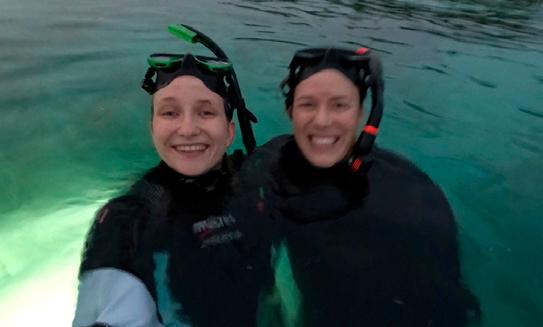
3 minute read
SIGNS OF HOPE IN THE MALDIVES
BY BIOSPHERE EXPEDITIONS
Since the first trip to the Maldives in 2011, Biosphere Expeditions has thus far trained over 100 people in Reef Check surveying, including over 30 local Maldivians in techniques on how to monitor their reefs and set up communitybased monitoring schemes. As a direct result, local NGO, Reef Check Maldives was formed in 2017 and is now active in community-based reef conservation work and advocacy.

Biosphere recently concluded its latest trip and brings us this update: We came here feeling pessimistic. Reefs are battered from all sides – warming oceans, bleaching, acidification, overfishing, exploitation, you name it, we humans inflict it on reefs and the natural world. Indeed some say that this current decade is the last to prevent the total collapse of reefs worldwide.

So we did not expect to find signs of hope, but we have. A dim light at the end of the tunnel, a flicker of hope, however faint. It’s no reason to celebrate, but it shows why citizen science is so important. Without the citizen scientists on this expedition, this message, which we will write up in a scientific report, would not exist or be heard. So thank you to all those on board for enabling this with their efforts and funds.

We have found some cause for hope for previously badly affected sites, mainly from the last 2016 mass bleaching event. Sites that are grazed by herbivorous fish and have not been colonised by corallimorphs, have partially recovered since 2016. True, the recovery is slow, but there is some recovery. Baby corals are taking a foothold, surviving on the skeletal corpses of once great boulder corals, finding a space for new life in between dead coral branches by clinging on and growing. But those reefs that have been colonised by corallimorphs are getting worse. They are or have phase shifted from coral to corallimorph reefs, blanketed by nothing but these fleshy creatures, which nothing eats and which take over everything. Once the brown carpet has taken over, nothing is left – no fish, no invertebrates, no corals. This has happened in other parts of the world, for example in Bermuda, where few coral reefs are left.

But we are not at this point in the Maldives, and we hope our work makes a small contribution to never getting there. Biosphere’s next Maldives expedition is scheduled for 5-11 October 2024. For more information on how to participate, go to: www.biosphereexpeditions.org/volunteeringinmaldives.com










